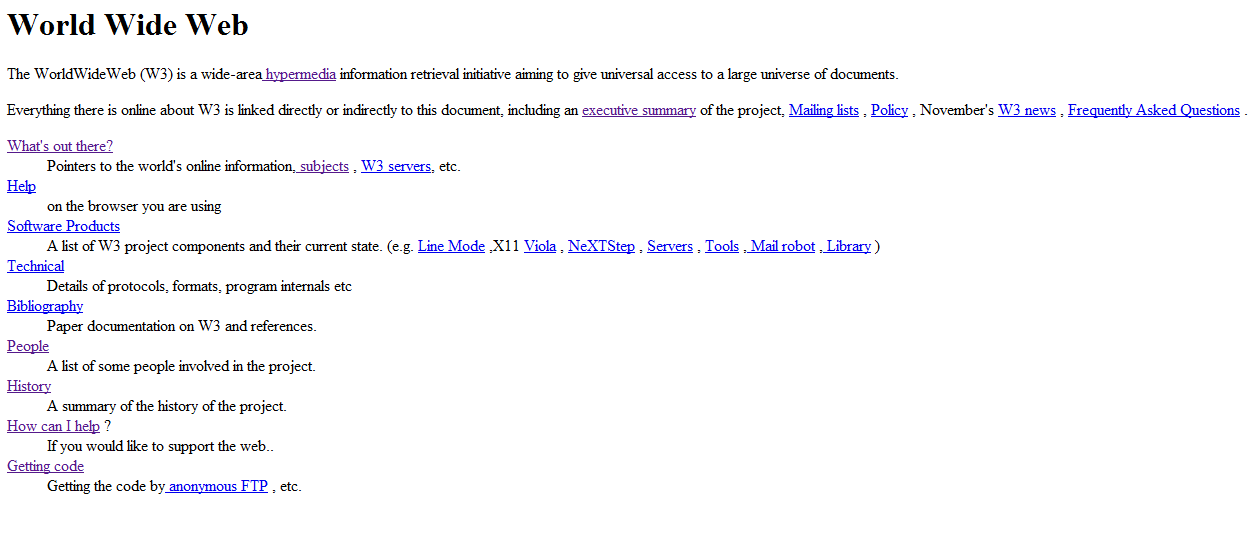What Was the First Website Ever?

The first website on the World Wide Web went live 21 years ago, in August 1991. The site explained the concept and history of the Web, provided links to all "the world's online information" — a list that lengthened as the Web grew — and outlined the process by which people could improve and expand the Web. It was created by Tim Berners-Lee, then a computer scientist at the European Organization for Nuclear Research (CERN) in Geneva.
The website's homepage, titled "World Wide Web," has been archived in its original form here (found via the techblog Gizmodo). In heavily hyperlinked Times New Roman text set against a white background, the page defined the World Wide Web as "a wide-area hypermedia information retrieval initiative aiming to give universal access to a large universe of documents."
Another page within the site directed readers to everything that was then available online, such as a page each devoted to law, the Bible, song lyrics and politics. The site requested that people "mail www-request@info.cern.ch if you know of online information not in these lists."
Berners-Lee, who invented the World Wide Web to create a depot of publicly available information that could be accessed over the Internet, wrote on his "executive summary" page, "The project is based on the philosophy that much academic information should be freely available to anyone. It aims to allow information sharing within internationally dispersed teams, and the dissemination of information by support groups. Originally aimed at the High Energy Physics community, it has spread to other areas and attracted much interest in user support, resource discovery and collaborative work areas."
On a page called "How can I help?" Berners-Lee instructed readers on how to post data of their own and write software that would help make the Web more usable. For example, he urged people to contribute by building search engines.
"Now the web of data and indexes exists, some really smart intelligent algorithms ("knowbots?") could run on it. Recursive index and link tracing, Just think..." he wrote. Google and other such search engines now exist.
Another of Berners-Lee's directives did not bear out. On a page called "Etiquette," he advised creators of webpages to explicitly state the status of information they post. "Some information is definitive, some is hastily put together and incomplete," he wrote. "Both are useful to readers, so do not be shy to put information up which is incomplete or out of date — it may be the best there is. However, do remember to state what the status is. When was it last updated? Is it complete? What is its scope?"
Sign up for the Live Science daily newsletter now
Get the world’s most fascinating discoveries delivered straight to your inbox.
Now, of course, the Web is a chaotic cobweb of information, old and new, true and false, trustworthy and misleading.
Follow Natalie Wolchover on Twitter @nattyover or Life's Little Mysteries @llmysteries. We're also on Facebook & Google+.
Natalie Wolchover was a staff writer for Live Science from 2010 to 2012 and is currently a senior physics writer and editor for Quanta Magazine. She holds a bachelor's degree in physics from Tufts University and has studied physics at the University of California, Berkeley. Along with the staff of Quanta, Wolchover won the 2022 Pulitzer Prize for explanatory writing for her work on the building of the James Webb Space Telescope. Her work has also appeared in the The Best American Science and Nature Writing and The Best Writing on Mathematics, Nature, The New Yorker and Popular Science. She was the 2016 winner of the Evert Clark/Seth Payne Award, an annual prize for young science journalists, as well as the winner of the 2017 Science Communication Award for the American Institute of Physics.










